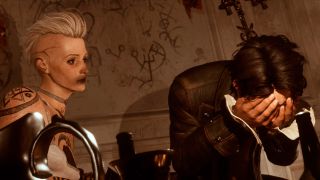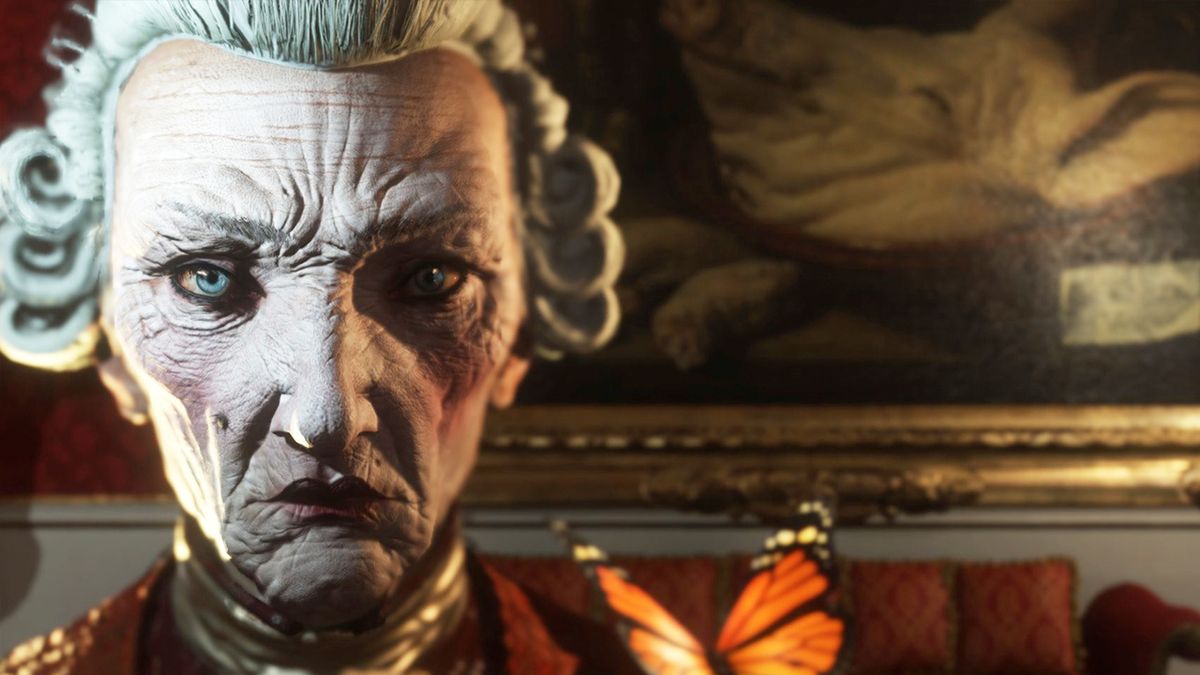12DOVE Verdict
Despite its promising new mechanics that make conversation a game of strategy, the interaction between its characters lets The Council episode one down.
Pros
- +
Intriguing characters keep you curious
- +
Opportunity and Confrontation mechanics makes you feel like a proper detective
Cons
- -
Characters are unconvincing when they’re together
- -
Oddly forced script
- -
Stale main character
Why you can trust 12DOVE
On some level, we’re all manipulative. Sorry, but it’s true. Sometimes that just means that when you want your parents to buy you that shiny new object, you know it’s not a good idea to tell them that you accidentally smashed their favourite vase. On other occasions some of us go full-blown Machiavelli and bruise our opponent’s ego in order to provoke a brash response that just happens to confirm our suspicions about topic X. Either way, for most of us reading people is a part of everyday life. Episode one of The Council - the narrative, episodic game from Big Bad Wolf - knows this very well indeed. Each conversation you have is a careful test of wits and strategy, yet when you stop talking and start observing the other characters, the flaws start to show.
Episode one is titled The Mad Ones, which is a pretty ominous indication of the kind of people you’ll be associating with. You’re a guest on the very island where your mother was last seen before her disappearance. Like you, she was a guest at the mansion of the mysterious Lord Mortimer. Around you are people from the highest strata of society: Napoleon Bonaparte, George Washington, a Duchess...some of them must know something. The only way to find out is by talking to them, probing for weaknesses with your words to find out which approach works best to make them spill the beans. As you build up your skill tree you develop your knowledge of etiquette, politics, history, and other topics, letting you read between the lines during innocuous chats. Spotting the significance of an odd references turns you into a proper investigator, doggedly following your leads. Insightful breakthroughs really feel groundbreaking, as cracking the hard exterior of the other characters takes more work than you’re used to in other narrative games.
(Not) the life of the party
Talking to the different characters one-on-one might be a war of words, but seeing them interact with each other is almost as exhausting as actual combat itself. For some reason all their charisma vanishes as soon as they’re talking to someone other than yourself, as if the only thing they’re good at is coyly hiding secrets and actual social interaction is a painful chore. Part of the gameplay focuses on how you behave during social scenes like an evening meal or drinks round the fire. If it were real life you’d be hiding your face behind your hands. Seeing the characters mingle is cringeworthy. Bewilderingly unfunny jokes are met with forced howls of laughter, as if someone’s standing behind you and holding up a cue card with ‘LAUGH’ scrawled on it. Some responses verge into melodrama too, ranging from the hilarious to the bemusing, like in one moment where Washington’s face registers intense surprise. Apparently because I didn’t have the ‘questioning’ skill I couldn’t ask what was wrong. To be honest his expression was so comically exaggerated that anyone standing a mile away could have seen the whites of his eyes. If they had made his facial tick a little more subtle, I can understand why I’d need a special skill to spot it, but to dangle something so obvious under my nose without letting me act on it is just frustrating.

You’re not much better, I’m afraid. By ‘you’, I mean Louis de Richet, the investigator you’re playing as. The only quality I’m certain he has is that he wants to find his mother (his inner monologue says as much as he carefully evaluates each bit of dialogue). That’s about as far as his character goes. Whether he’s impulsive, charming, cunning, or intelligent I really couldn’t say - and that’s even after I’ve pursued the manipulative dialogue option so many times I might as well have ‘villain’ plastered across my forehead. The problem is that Louis speaks is as if he’s reading lines from a bit of paper, never injecting any real feeling into them. More than once I ended up wondering how on earth characters were believing what was coming out of my mouth as my tone was so unconvincing. Plus, hearing him call his mum an “old bird” and telling her to “act her age” didn’t exactly endear me to the young cad.
Hidden depths
However, the other characters - when you can get them on their own - are intriguing in all the right ways, even if they do speak with bizarre intonation every now and again. Noticing when they dodge questions and respond to different approaches truly is fascinating and I quickly became a different person depending on who I chat to. To the Duchess I was frank and honest, inviting her trust, while I humiliated (an actual skill you can use) the servants until I got my way. Having a typical conversation isn’t the only way to get the upper hand, though. Opportunities give you seconds (literally) to spot something wrong with the scene in front of your eyes and draw a conclusion from it. Just like a real detective, this sells the idea that Louis is always on the look-out for clues and everything around me is a performance of some kind. They might be over quickly, but just suspecting that an Opportunity is on the horizon put me on my guard as I paid intense attention to everyone around me, sucking me into the conniving world of The Council.
But Louis can’t always be cunning. The Council knows that things don’t always go to plan, and puts your skills to the test when you touch upon an especially delicate topic. What starts as an easy conversation can turn into a Confrontation, where a limited chance to reveal a bit of information appears that requires careful charismatic maneuvering. Mess up once too often and Louis’ opponent will end the conversation without revealing anything. However, when I played my cards right, I was rewarded with a crucial detail to help in my investigation. Like with Opportunities, I felt like I was playing a game of cat-and-mouse during the Confrontations, carefully thinking about how each response could be interpreted by the person I was talking to and doing my best to manipulate them in just the right way. When I got it right, I felt pretty smug. I even began to look forward to Confrontations. Turns out it’s easier to become a part of the secretive world of The Council than you’d expect.
Yes, I’m two-faced. But that’s the whole point of The Council. Being able to dip in and out of different versions of Louis is thrilling, as mastering the ability to push the other characters’ buttons yields revelations for the main plot. Yet despite these characters coming alive when I’m left alone with them, their wooden behaviour with each other along with Louis’ uneven temperament makes me think there’s something missing from this first episode. Perhaps everything I’m seeing is a sham, and they’re all conspiring with each other and are just incredibly bad at acting nonchalant when they’re together. If that’s not the case, though, for now they’re what’s holding The Council back.
While here at GamesRadar, Zoe was a features writer and video presenter for us. She's since flown the coop and gone on to work at Eurogamer where she's a video producer, and also runs her own Twitch and YouTube channels. She specialises in huge open-world games, true crime, and lore deep-dives.

